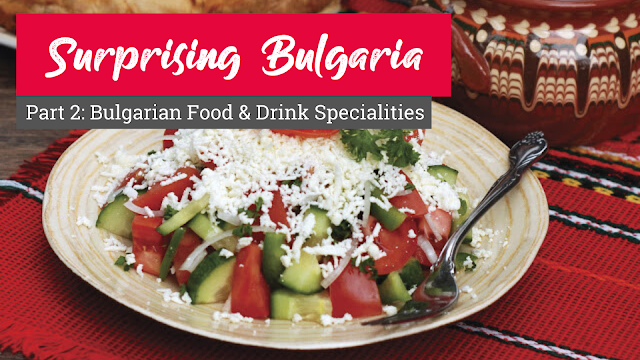Surprising Bulgaria - Part 2: Bulgarian Food & Drink Specialities

Great food and drink are integral to a memorable holiday. Many visitors to Bulgaria are surprised by the high quality of ingredients in dishes in Bulgaria, and the sheer variety on offer. Here is our list of unmissable choices to help any holiday here start on a high.
Shopska Salad
Widely available, this is no ordinary salad. On offer in restaurants and cafés such as on the open-air veranda at the Hotel Venus, little gem in the middle of Sunny Beach, this salad can be eaten either as starter or a light main course. It’s made of chopped tomatoes, cucumbers and onions, covered with slivers of salty white cheese called Sirene, or feta. The key is the freshness of the ingredients, and the large chunks of the moist vegetables. Lots of cheese on top is vital to this tasty dish. By the way, the name comes from the Shopluk region and the colours of the salad are said to represent the white, green and red of the Bulgarian flag.
Bean Soup (Bob Chorba)
Bean Soup is a hearty traditional Balkan soup delicately flavoured with dzhodzhen (spearmint). This is a simple but filling soup. Its ingredients include beans, onions, tomatoes, carrots and sweet peppers. There is a wide variety of beans available in Bulgaria, and the most popular for this soup are white beans or kidney beans. A variant is Green Bean Soup, which is prepared with runner beans, marrows and courgettes. Another variant for meat-lovers is to add pieces of pork meat, spiced with crushed chilli peppers.
Kapama
Kapama comes from the area around Bansko, in the mountains, and comprises meat, rice and sauerkraut simmered and served in a clay pot. The meat includes pork, chicken and veal. Spices are key, including pepper, paprika and bay leaves. On top of all the layers, goes a lid of dough! Once all the elements are assembled, the pot needs a long time in the oven, up to five hours. Often served at Christmas and New Year, it’s wonderful year-round. It’s meaty, hearty and filling.
Banitsa
Banitsa is incredibly indulgent and moreish. You have been warned! The basic ingredients are filo pastry, crumbled cheese and eggs. Banitsa can in fact be sweet or savoury, both delicious, and eaten hot or cold. Many in Bulgaria eat it for breakfast, but of course, it’s delicious at any time of the day and moreish. Savoury versions could include spinach or pumpkin flavours.
Coffee
Bulgarians love coffee, and drink it morning, noon and night at kiosks, cafés and bars across the country. Good espresso coffee is available everywhere.
Rakia
This is the unmissable national spirit and is a clear and potent kind of brandy. There are many brands available. Traditionally distilled from plums, today Rakia is often made from grapes. It’s served with ice in restaurants and bars. The alcohol content is normally around 40%. Many say it’s best sipped slowly with Shopska Salad at the beginning of a meal. But it can be drunk either as an aperitif or a digestif with the gloopier varieties working well at the end of a meal.
Wine
The production of wine in Bulgaria is an ancient tradition dating back to the 6th century BC. Bulgaria today is among the world’s most prolific wine-producing nations. There are five recognised wine-growing regions, producing decent red wines, including Cabernet Sauvignon and Merlot and whites include Chardonnay and Sauvignon Blanc. The most important region is The Thracian Valley centred on Plovdiv. The climate plays a big part in the success of wine production here, with hot summers and icy winters. In total there are around 300 wineries in Bulgaria and demand shows no sign of slowing down.
Beer
Beer, translated ‘bira’ in Bulgarian is very popular and served everywhere. The beer brands brewed in Bulgaria have a superb quality and an excellent taste. The leading nationwide brands are Zagorka, Kamenitsa and Astika. Regional beers include Shumensko and Pirinsko. Since 2010 there has been a rise in craft beers in the country. Now, beer lovers have a much bigger choice and the number of micro-breweries is on the rise. Quirky choices can even be found, with experimental beers emerging, featuring radish, plum or pumpkin flavours. Look out for so-called ‘gypsy brewers’ who do not own a brewery but brand beer and create recipes, relying on other companies’ breweries.
Check back next week for Week 3 of Surprising Bulgaria – all about Festivals and Fun.
Savings of up to £100 per person are available online now.



